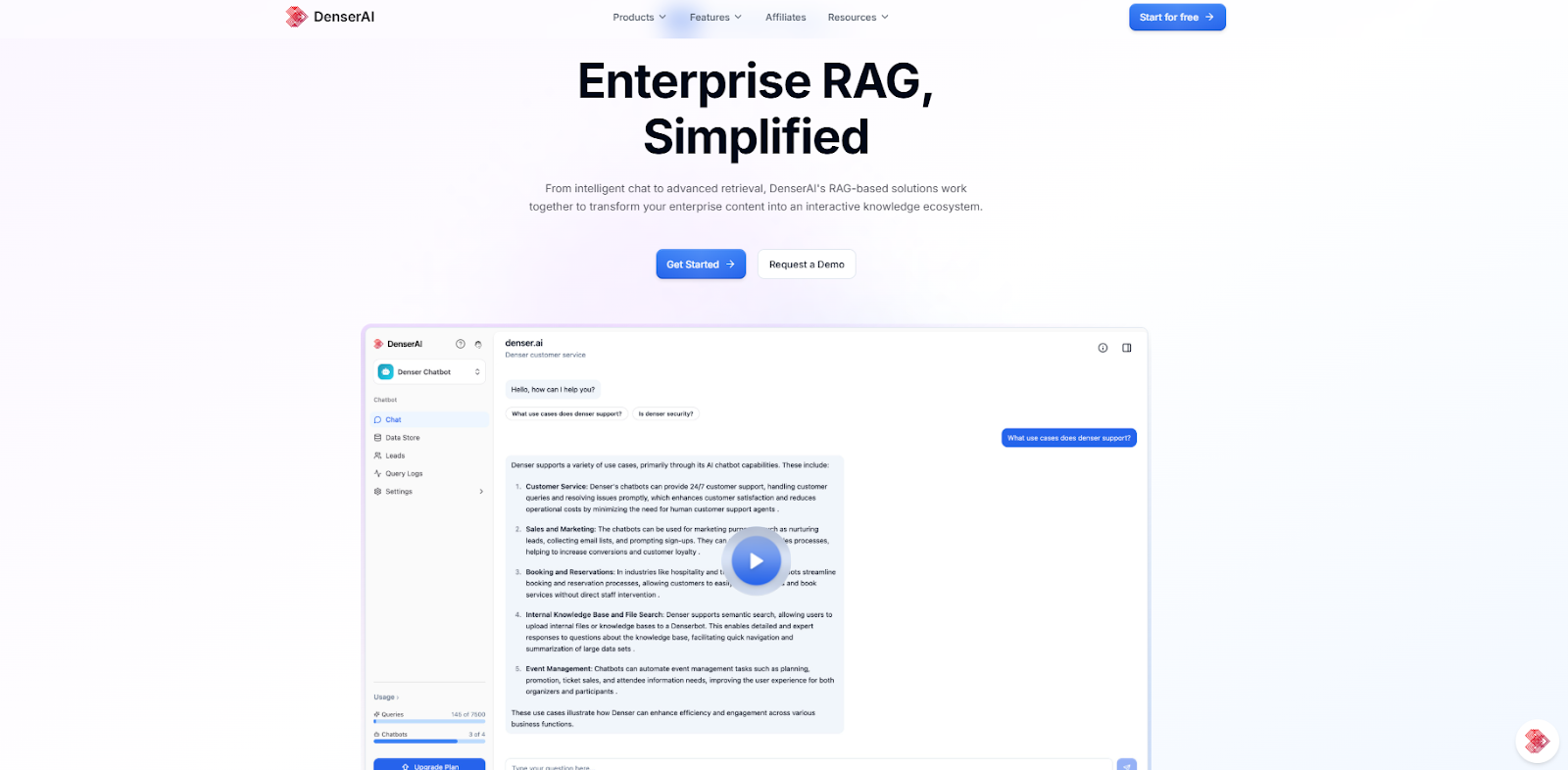
Types of Enterprise Chatbot Solutions on the Market In 2025

No matter how well-trained your support agents are, the pressure of managing multiple conversations at once can slow down response times and leave customers frustrated.
If your support system isn’t optimized, your business risks falling behind, as slow responses and impersonal interactions hurt the overall customer experience.
More businesses are now using chatbots as their primary customer service channel. It allows them to automate routine tasks like answering FAQs, processing transactions, and guiding users through troubleshooting steps.
Unlike basic bots, AI-driven chatbots provide personalized customer service by integrating with your CRM, helpdesk, and internal knowledge bases. They recognize past interactions, tailor responses to each user, and ensure that customers get instant, relevant assistance without long wait times.
With AI-driven automation, you can shorten response times and allow your human agents to focus on complex, high-value interactions that require personal attention.
In this article, we’ll explore how enterprise chatbot solutions work, their biggest advantages, and what to consider when implementing one. If you're looking to automate customer service or improve engagement across multiple platforms, you'll learn how AI chatbots can help you scale your business.
Common Mistakes in Chatbot Implementation#
Many businesses invest in enterprise chatbot solutions, expecting instant improvements in customer service, sales, and internal operations. However, chatbots often fail to deliver the expected results due to poor implementation.
A chatbot is only as good as its setup. If it cannot understand customer intent, access real-time data, or transition to human agents when needed, it becomes frustrating instead of helpful. Forrester Research found that over 50% of chatbots fail to meet business goals due to these issues.
Poor Training and Limited Learning#
Businesses expect AI to handle conversations immediately. But chatbots require thousands of interactions to recognize patterns, process intent, and provide useful responses.
For example, a retail chatbot should know the difference between a refund request and a shipping inquiry, even if customers phrase them differently. Without proper AI training, the bot might not recognize these variations. It can lead to incorrect responses and customer frustration.
Solution: Fixing this requires using real customer interactions to train the AI model. The chatbot should be exposed to diverse conversation patterns, allowing it to recognize different ways people ask the same question.
It’s also important to update the chatbot regularly with new FAQs, product information, and policy changes so it stays relevant.
No Human Backup When Chatbots Fail#
Customers often ask complex questions that AI cannot interpret correctly, such as policy exceptions, technical issues, or emotionally charged complaints.
Many companies make the mistake of removing human support altogether, expecting AI to handle every situation. This leads to customers getting stuck in chatbot loops, receiving unhelpful responses, and having no way to escalate their issues.
Solution: A chatbot should be designed to recognize when human assistance is needed. If a user expresses frustration or repeatedly requests an agent, the chatbot should transfer them to a live representative.
Limited Integration With Business Systems#
For a chatbot to be useful, it must connect with a company’s CRM, order management system, and other databases.
Many businesses fail to link chatbots with essential tools that force customers to repeat information that the system should already know. Without integration, customers would need to enter their details every time, which makes them inefficient.
Solution: You should ensure the chatbot is connected to internal databases. With API integration, a chatbot can retrieve customer history, check inventory, and even process refunds.
A properly integrated chatbot reduces the workload for support teams while delivering accurate, personalized responses.
Scripted Responses Instead of Adaptive AI#
Chatbots that rely too much on pre-set scripts often frustrate users. These bots do not adapt when customers phrase questions differently, which leads to incorrect or generic answers.
AI-driven chatbots should be built with natural language processing (NLP) to recognize variations in phrasing, tone, and intent.
Solution: To fix this issue, you need to train chatbots using real customer conversations rather than relying on pre-written responses. Adaptive AI learns from past interactions, so it adjusts replies based on user behavior and provides more natural conversations.
The chatbot should analyze the full sentence to determine what the user means rather than focusing only on specific keywords. This makes conversations feel more human-like and improves response accuracy.
Over-Promising Chatbot Capabilities#
While AI chatbots can automate many tasks, they cannot handle complex, multi-step problem-solving the way a human can. When customers expect too much from a chatbot and receive unhelpful responses, their trust in the system declines.
Solution: You should treat it as an evolving tool that improves over time. A chatbot that is regularly updated, properly trained, and integrated can improve customer interactions and operational efficiency.
Ignoring User Experience and Personalization#
A chatbot should be easy to use, engaging, and personalized. Many businesses overlook user experience, which makes chatbots feel robotic or difficult to interact with.
A chatbot that asks too many irrelevant questions or provides long, confusing responses can frustrate users rather than help them.
Solution: Chatbots should remember past interactions instead of forcing users to repeat the same information every time. This includes past interactions, greeting returning users by name, and tailoring responses based on previous conversations.
AI-driven sentiment analysis can also help the chatbot adjust its tone depending on the customer’s mood, whether they’re making a routine inquiry or dealing with a complaint.
5 Enterprise Chatbot Solutions: Side-By-Side Comparison#
Some chatbots specialize in customer service, while others are great for sales automation, internal IT support, or AI-powered decision-making.
Let’s compare the top enterprise chatbot platforms based on capabilities, integration, pricing, and performance.
1. Denser.ai#
If you're looking for a chatbot that does more than just answer simple questions, Denser.ai is built for your business.

This enterprise conversational AI platform transforms your website and documents into an interactive knowledge base where users can ask questions and get accurate, verifiable answers instantly.
If you’re handling customer support, internal knowledge management, or business automation, this AI-powered solution scales with you. Here are the compelling reasons why you should choose Denser:
AI-Powered Knowledge Base#
Traditional chatbots often struggle to pull relevant information from large content repositories, leaving users frustrated. Denser.ai solves this by turning your website, PDFs, and internal documents into an interactive knowledge hub.
Instead of manually searching for information, users can ask the chatbot and receive instant, AI-generated responses pulled from verified sources.
Verifiable AI-Powered Responses#
Many solutions generate responses without backing them up with sources, which can lead to misinformation and trust issues.
Denser.ai provides highlighted source references for every response, ensuring users receive accurate, transparent, and verifiable answers.
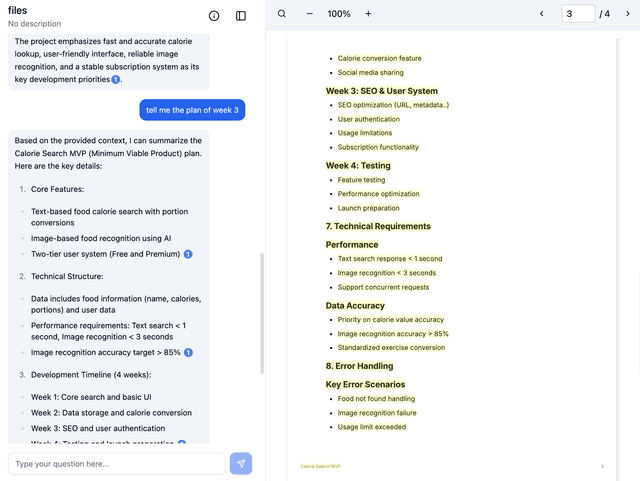
If your business operates in a regulated industry like finance, healthcare, or legal services, this feature is essential. You can provide customers with AI-powered automation while maintaining full transparency and compliance.
Understand Complex Questions With Advanced AI#
Most chatbots struggle with complex queries. They rely on keywords rather than true understanding, leading to generic or irrelevant answers. Denser.ai is unique and uses semantic AI technology.
This AI solution doesn’t just analyze text but also understands tables, charts, structured data, and detailed reports.
If a user asks about financial projections, product specifications, or regulatory compliance, Denser.ai can pull the right information from your documents, interpret the data, and deliver a meaningful response.
For businesses handling large datasets, industry-specific documents, or multilingual content, this keeps your chatbot from adding value aside from automating FAQs on your website.
Scale as Your Business Grows#
If you're handling high query volumes or large content databases, you need a solution that scales with your enterprise, not one that slows down as demand increases.
Denser.ai is built for scalability. If you have thousands of product pages, a growing customer base, or an expanding knowledge repository, this chatbot can manage it all without losing speed or accuracy.
Keep Your Data Secure#
Security is a top priority when deploying AI in an enterprise environment. You can’t afford to risk customer data, internal records, or sensitive business information.
Denser.ai offers private cloud deployment options, advanced encryption, and strict access controls, giving you enterprise-level security. If you operate in regulated industries or handle confidential data, this keeps your AI chatbot fully compliant while protecting your business assets.
Integrate with Your Existing Platforms#
A chatbot should fit into your existing workflow and not force you to change your systems. Denser.ai integrates with platforms like Slack, Zapier, Shopify, and embeddable widgets.
You can automate customer support without disrupting your service teams and simplify internal knowledge sharing for HR, IT, and operations. You can also improve the e-commerce experience by guiding customers through purchases.
Denser.ai Pricing Plans#
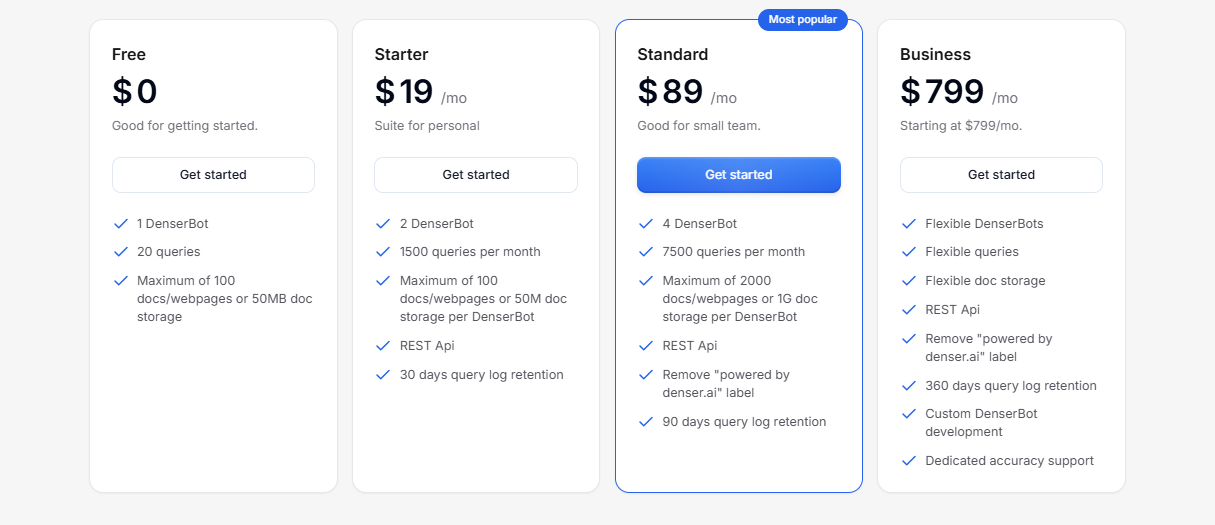
- Free Plan: Ideal for businesses and individuals who want to explore chatbot capabilities before committing to a paid plan.
- Starter Plan ($19/month): Perfect for personal use, offering essential chatbot features to automate conversations and enhance engagement.
- Standard Plan ($89/month): Best for small teams that need more capacity, advanced automation, and better integration options.
- Business Plan (Starting at $799/month): Built for growing businesses that require flexible DenserBots, customizable queries, and extended document storage.
- Custom Plan: Tailored chatbot solutions for large enterprises with unique requirements. Pricing is based on your business needs.
No matter your business size, Denser.ai provides scalable AI chatbot solutions to automate interactions and improve customer experience. Sign up a free trial or schedule a demo now!
2. IBM Watsonx Assistant#
IBM Watsonx Assistant is an AI-driven platform that lets you create virtual agents to improve customer interactions and internal processes. It offers a user-friendly interface with a drag-and-drop conversation builder and pre-built templates, facilitating quick setup.
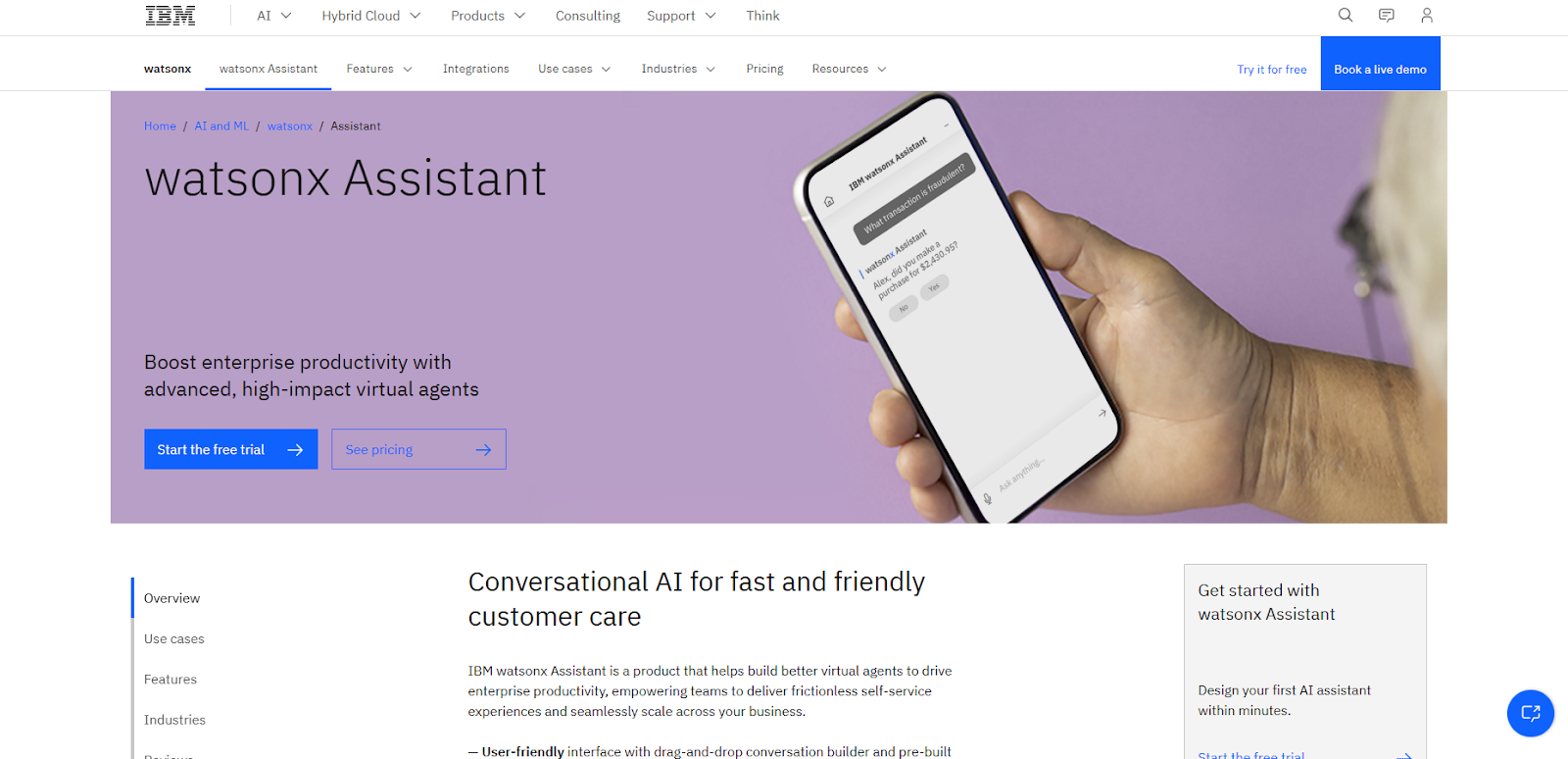
Image Source: ibm.com
The platform supports omnichannel deployment for integration across various devices and communication channels. Also, it provides enterprise-grade security features, including private cloud deployment options, to protect sensitive data.
However, Watsonx Assistant is tied to IBM’s infrastructure and is not easily used outside of an IBM container. The portal for building AI models also takes time to configure, train, and fine-tune models.
If you need an efficient chatbot solution, Denser.ai offers an alternative for quick deployment and quick integration. It also offers scalable intelligence without the need for extensive technical expertise.
Pricing#
- The Lite plan is a free option that provides the basics for quickly creating AI chatbots.
- The Plus plan, starting at $140 per month, includes generative AI capabilities, integration tools, and analytics.
- For larger teams, the Enterprise plan offers all the features of the Plus plan, with enterprise-grade security, scalability, and customization options. (Price varies based on team size and business needs)
3. Drift#
Drift is a conversational marketing platform for customer engagement and sales processes. It lets you interact with website visitors in real time and guide users through the sales funnel.
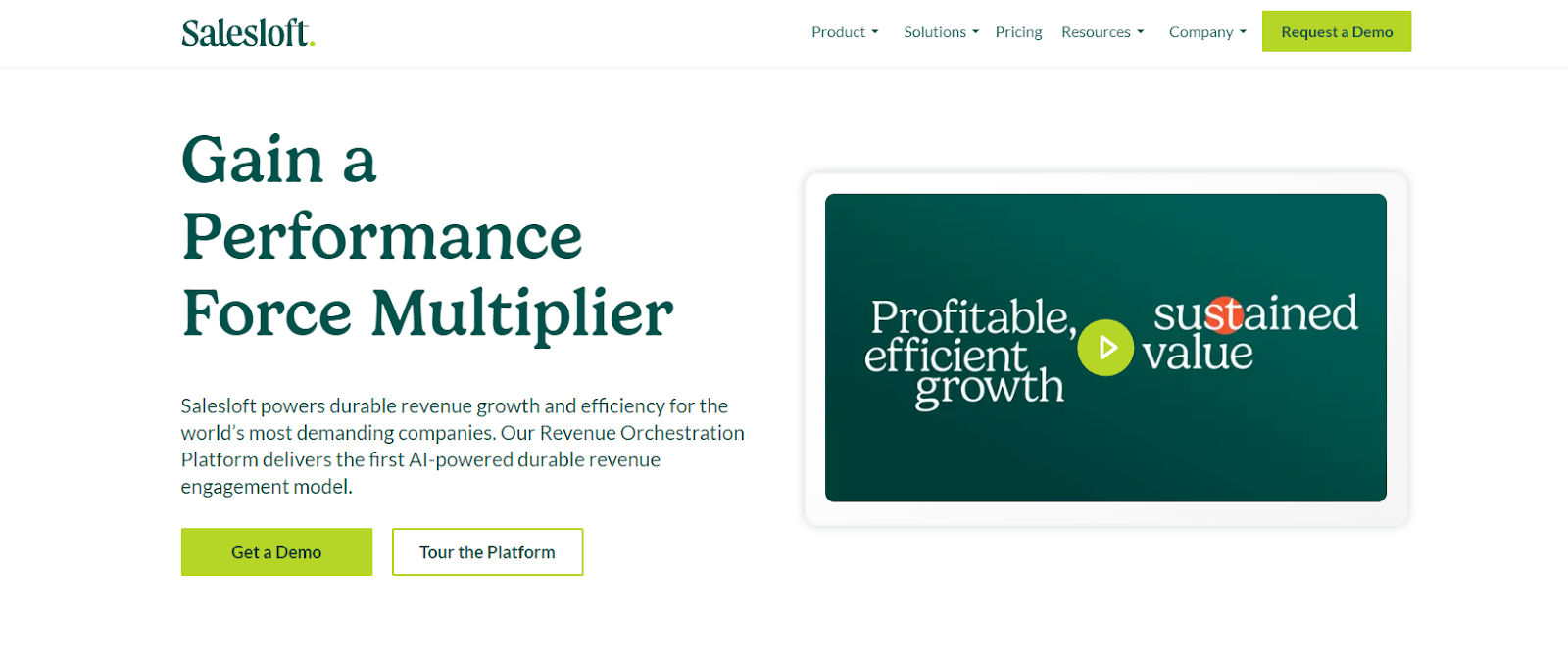
Image Source: salesloft.com
Its key features include AI-powered chatbots that automatically qualify leads, personalized conversational marketing strategies, and detailed analytics to understand customer behavior. These tools aim to improve user experience and increase the efficiency of sales teams.
However, some users have reported that the platform's customization options are less flexible compared to other solutions, which can be a drawback if you need tailored interactions.
Also, the initial setup and optimization may require time and effort, particularly for advanced features.
If you need an adaptable and user-friendly chatbot solution, Denser.ai is designed for quick deployment and seamless integration.
Pricing#
Drift does not disclose exact pricing on its website.
- The Advanced plan helps you convert deals and win customers with sales engagement tools.
- The Premier plan is designed to generate predictable revenue and support long-term sales growth.
4. Intercom#
Intercom is a customer communication platform that offers live chat support, automated chatbots, email support, and a knowledge base.
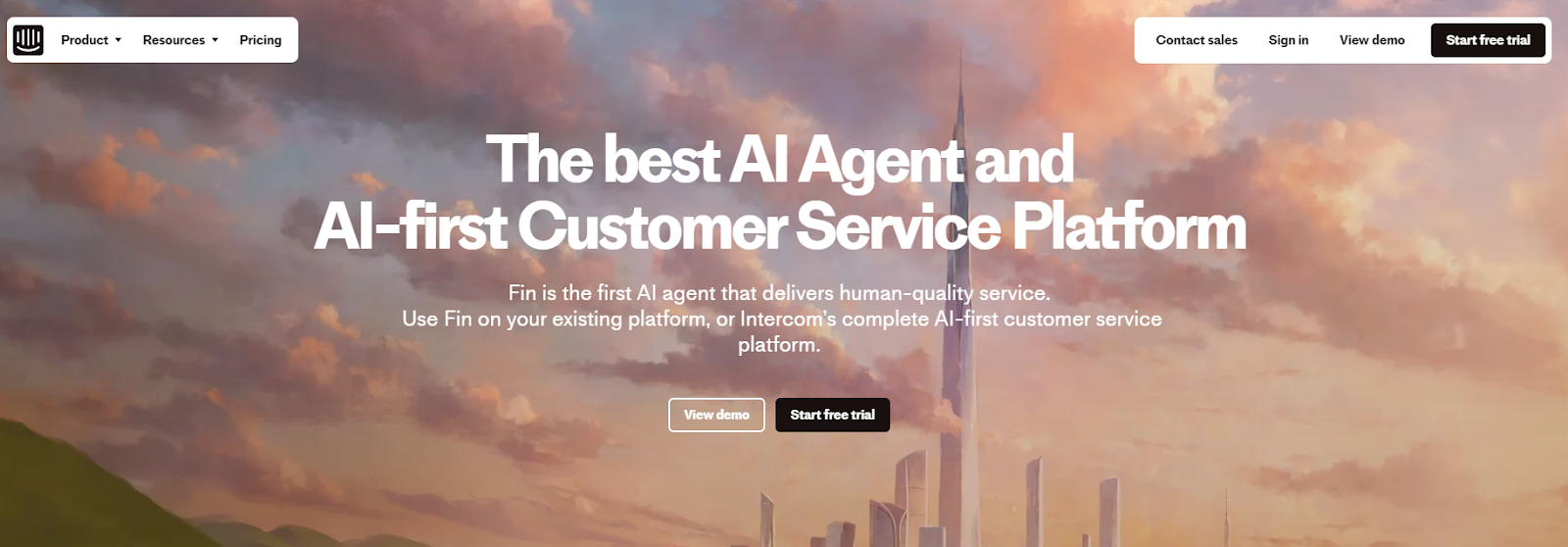
Image Source: intercom.com
The platform's automated chatbots can initiate interactions using advanced targeting, qualify leads without human intervention, and direct important matters to the appropriate team members. Its email support integrates in-app messaging and email into a unified inbox.
Despite these capabilities, Intercom can be expensive, with costs scaling based on the number of leads and users tracked. Essential features such as Outbound Messages, Custom Bots, Answer Bots, and Product Tours come with additional charges.
Pricing#
- The Essential plan costs $39 per seat per month and is great for individuals, startups, and small businesses.
- The Advanced plan, at $99 per seat per month, includes AI tools and automation for growing teams.
- The Expert plan, priced at $139 per seat per month, provides collaboration, security, and multibrand support for larger teams.
You can also get Fin AI Agent for $0.99 per resolved customer conversation instead of a monthly fee.
5. Zendesk Chat#
Zendesk Chat is a basic AI chatbot solution that works well for businesses that are already using Zendesk’s customer support software.
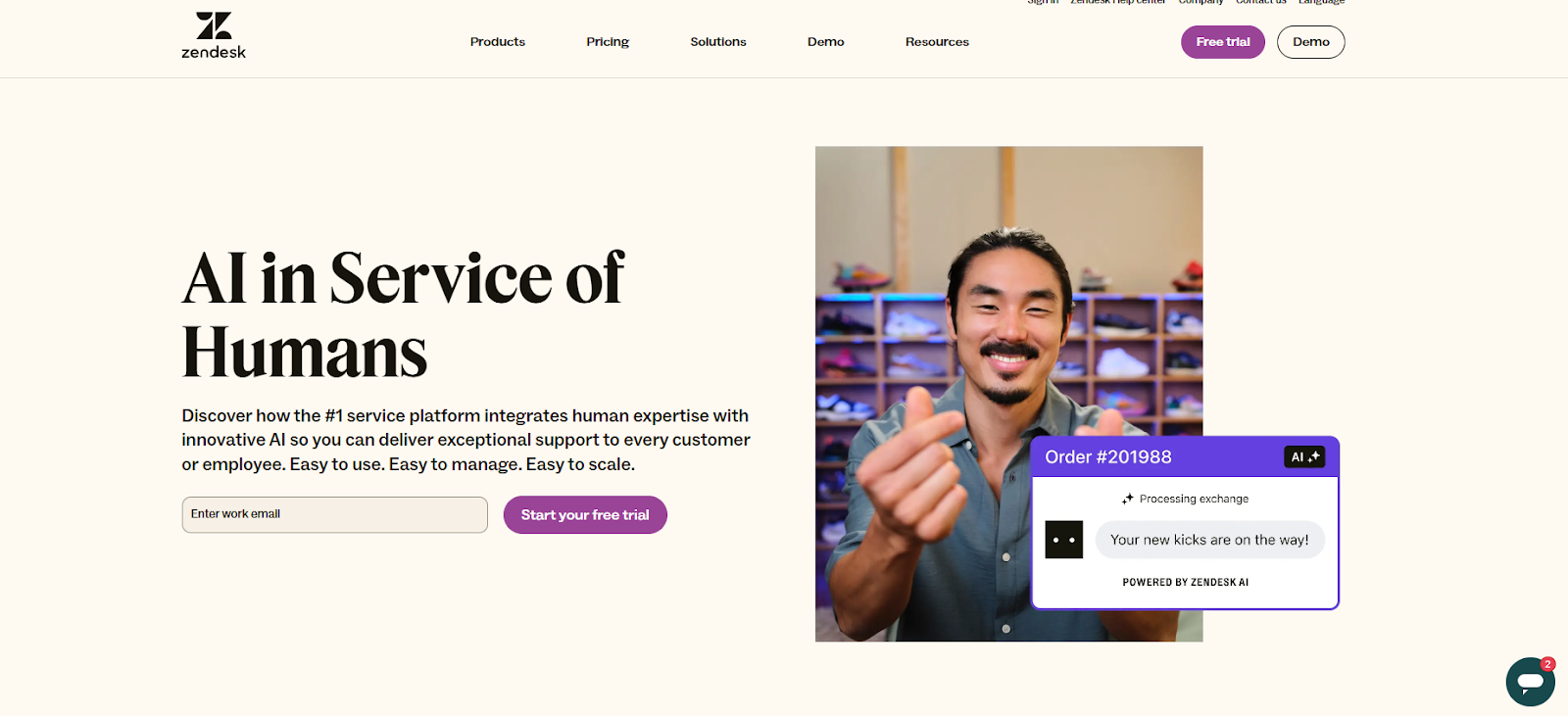
Image Source: zendesk.com
Its key features include live chat support, integration with various communication channels, and a unified dashboard for managing customer interactions. The platform also offers automation capabilities, such as chatbots, to handle common customer queries and support processes.
However, some users have reported that the platform’s interface can be confusing and requires frequent visits to the Help Center to find answers. More built-in instructions would improve usability instead of forcing users to rely on external support.
Pricing#
- The Support Team plan, at $25 per month, provides easy-to-use tools, including a ticketing system, email, chat, voice, and social messaging.
- The Suite Team plan, priced at $69 per month, enhances efficiency with automation and better self-service options.
- The Suite Professional plan, at $149 per month, includes advanced team management tools along with all features from Suite Growth.
- The Suite Enterprise plan is available with custom pricing upon request, ideal for large businesses needing custom AI-driven content suggestions and detailed access controls.
How Enterprise Chatbots Work#
If you’ve ever interacted with a chatbot that provided an instant, accurate response, you’ve seen an AI-driven enterprise chatbot in action. But why do some chatbots feel natural and helpful while others seem robotic and frustrating?
The difference lies in advanced AI technology, machine learning, and system integration.
Unlike simple bots that rely on pre-set scripts, enterprise chatbots continuously learn, analyze conversations, and improve over time. They understand intent, retrieve real-time data, and offer personalized solutions.
Natural Language Processing for Understanding Conversations#
When a user types a message, a chatbot doesn’t just look for keywords. Instead, NLP allows it to break down sentence structures, detect intent, and interpret meaning.
A well-trained AI chatbot can:
- Recognize different ways of asking the same question
- Detect emotions (such as frustration or urgency) and adjust responses accordingly
- Extract important details like names, dates, or order numbers from a conversation
If someone asks for a refund, the chatbot won’t just recognize the word refund. It will understand that the user is asking about a past purchase and may request an order number before proceeding.
Machine Learning for Continuous Improvement#
Unlike basic chatbots that provide fixed responses, AI-powered chatbots improve with every interaction. Machine learning helps chatbots identify patterns in customer inquiries, adapt to new user behaviors, and self-correct errors by learning from past mistakes.
If customers frequently ask, "Do you offer free shipping?" but the chatbot isn't trained for that question, AI will recognize the demand and update its knowledge base to include the correct response.
Real-Time Data Integration for Smart Responses#
The most powerful chatbots pull live data from business systems to provide accurate answers. It integrates with customer relationship management (CRM) software, e-commerce platforms, and an internal database.
Chatbots can retrieve order details, check inventory availability, and process payments, refunds, and returns without human help.
Where Chatbots Make the Biggest Impact on Enterprises#
If you’re looking to cut costs, save time, and improve efficiency, enterprise AI chatbot solutions can help in ways you may not have considered. Let’s take a closer look at its biggest cost-saving opportunities.
Cut Customer Service Costs#
If your business relies on human agents for customer support, you know how expensive it can get. Whether it’s handling inquiries, resolving complaints, or troubleshooting issues, support teams take up a huge portion of operational expenses.
With AI, chatbots take care of simple cases instantly so human agents can focus on complex issues.
Instead of hiring more agents during peak seasons, a chatbot can handle frequently asked questions, troubleshoot common problems, and provide instant responses. Customers no longer have to wait in long queues, which reduces frustration and improves service quality.
Since chatbots operate 24/7, you eliminate the need for extended customer service hours, overtime pay, and additional staffing costs.
Boost Sales and Revenue#
Beyond customer support, chatbots are also proven tools for increasing sales without increasing marketing or staffing expenses. A chatbot on your website can answer product-related questions, suggest relevant items, and guide users toward completing their purchases.
Instead of waiting on human sales reps for every customer inquiry, an AI chatbot can recommend products based on customer preferences and handle upsells and cross-sells. It can even recover abandoned carts by reminding users about unfinished transactions.
Chatbots also shorten the buying journey by addressing objections in real time. If a customer is unsure about a product or service, the chatbot can provide instant clarifications for ease of purchase decision.
The faster you assist customers, the higher your chances of closing a sale without additional costs.
Reduce HR and Employee Support Costs#
Chatbots aren’t just useful for external interactions. Many companies spend a huge amount on HR and IT support, dealing with employee requests, onboarding, and troubleshooting issues.
Chatbots can automate these tasks to reduce the burden of extra workload on teams. HR teams answer the same payroll and benefits questions and leave request questions every day. IT helpdesks deal with countless password resets and system access issues.
Instead of overloading these departments with repetitive requests, chatbots can automate responses, provide self-service troubleshooting, and even assist with onboarding new employees.
Chatbots in IT departments can also diagnose simple tech issues to reduce the number of helpdesk tickets and lower operational costs.
Lower Lead Generation and Marketing Costs#
Generating leads is expensive, especially when you rely on paid ads and manual outreach. AI chatbots can engage website visitors in real time and filter high-intent prospects before passing them to the sales team.
Therefore, there is no wasted effort on unqualified leads; only serious buyers reach your sales representatives.
Lead-generation chatbots can also nurture leads by providing helpful content, answering pre-sale questions, and offering promotions. It keeps potential customers engaged without additional marketing spend.
Unique Ways Enterprises Use Chatbots#
Most people associate enterprise chatbot solutions with customer service, but their use extends far beyond answering basic queries. Let’s explore the various ways chatbots are being used across different industries.
AI-Driven Financial Advisors for Banking#
Banking institutions are integrating AI-powered chatbots to assist customers with financial planning, account management, and fraud prevention.
Unlike traditional customer support bots, these AI-driven financial advisors analyze user spending habits, offer budget recommendations, and even suggest investment opportunities.
Chatbots in banking provide instant transaction history, monitor suspicious activity, and alert customers about unusual transactions. With machine learning, these bots can detect patterns that may indicate fraud, which helps protect user accounts and prevent security breaches.
For loan applications, chatbots also guide users through the process, explain eligibility criteria, and even pre-qualify applicants by analyzing financial data.
Automate Legal Document Processing#
Law firms and corporate legal departments handle large volumes of contracts, agreements, and compliance documents. AI chatbots are now being used to automate legal document review, contract analysis, and regulatory compliance checks.
Rather than manually sifting through pages of legal text, chatbots equipped with NLP can scan documents, highlight key clauses, and identify potential risks. These bots ensure that contracts comply with industry regulations to avoid legal disputes.
Chatbots also assist by generating standard legal documents like NDAs, employment contracts, and service agreements, reducing the workload for legal teams. It speeds up document processing and minimizes errors in legal paperwork.
Virtual Health Assistants in Telemedicine#
The healthcare industry is adopting AI-driven chatbots to support telemedicine by providing symptom assessments, scheduling appointments, and offering medication reminders.
These virtual health assistants help both patients and medical professionals by reducing the need for unnecessary in-person visits.
A chatbot integrated into a hospital system can assess symptoms based on patient input and determine whether urgent medical attention is needed. It can connect patients with the right specialists, process insurance claims, and provide personalized health tips.
For chronic disease management, AI chatbots help patients track medication schedules, monitor blood sugar levels, and provide lifestyle recommendations. This improves patient engagement while reducing the administrative burden on healthcare providers.
Cybersecurity for Real-Time Threat Monitoring#
As cyber threats grow more sophisticated, businesses are turning to AI chatbots for real-time threat detection and response. These chatbots continuously monitor network activity, detect anomalies, and alert security teams to potential breaches before they escalate.
Chatbots powered by machine learning and behavioral analysis can identify unusual login attempts, unauthorized data access, and phishing attempts. They act as the first line of defense and respond instantly to potential threats.
These AI-driven security bots provide automated risk assessments, security recommendations, and proactive threat mitigation for enterprises managing large-scale digital infrastructure.
So—Are Chatbots Worth It?#
The short answer is yes. However, only when businesses choose the right AI-driven chatbot solution can they implement it correctly.
Companies that use well-designed chatbots see lower operational costs, improved customer satisfaction, and increased efficiency in sales, support, and internal workflows.
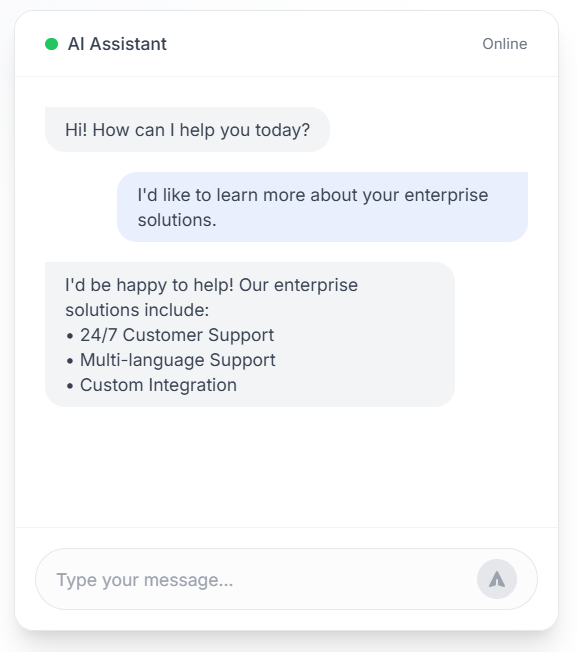
Many chatbot failures occur because companies deploy rigid, rule-based bots that can only respond to pre-set commands.
However, modern AI-powered solutions like Denser go beyond basic automation. These chatbots use advanced technology to understand user intent, provide personalized responses, and continuously improve from each interaction.
With an AI chatbot, you create a dynamic, real-time support system. Instead of forcing customers to wait on hold or dig through FAQs, a chatbot can handle inquiries instantly.
Even better, when integrated with your existing systems, it can pull live data, process requests, and even assist with sales conversions. Unlike outdated chatbots that give robotic replies, Denser adapts to each conversation to make interactions feel natural.
Also, consider the impact of reducing response times from minutes to seconds. If 70% or more of customer interactions can be automated, that’s a huge reduction in labor costs.
The future of chatbots proves that they are intelligent virtual assistants that predict needs, analyze behavior, and help businesses make smarter decisions.
If you want to scale your support, improve efficiency, and focus your team on higher-value tasks, an AI chatbot like Denser is a smart investment for your enterprise.
Deliver Real-Time, AI-Driven Interactions Across Your Enterprise With Denser.ai!#
Your business needs more than just a chatbot. Denser.ai is built to help your business automate conversations, deliver accurate AI-driven responses, and integrate with your existing tools.
If you're handling customer support or internal knowledge sharing, this AI chatbot provides intelligent, real-time interactions that scale with your business needs.
Unlike traditional chatbots that provide pre-scripted responses, Denser.ai uses advanced contextual AI to deliver accurate, real-time answers backed by source references.
It integrates with CRM systems, helpdesks, and enterprise platforms to automate conversations without disrupting workflows.
Plus, with enterprise-grade security and private cloud deployment options, your valuable data remains protected while your AI assistant handles high-volume interactions with ease.
Now is the time to upgrade your business with an AI chatbot that does more. Choose Denser.ai for a smarter, more scalable solution that drives real results!
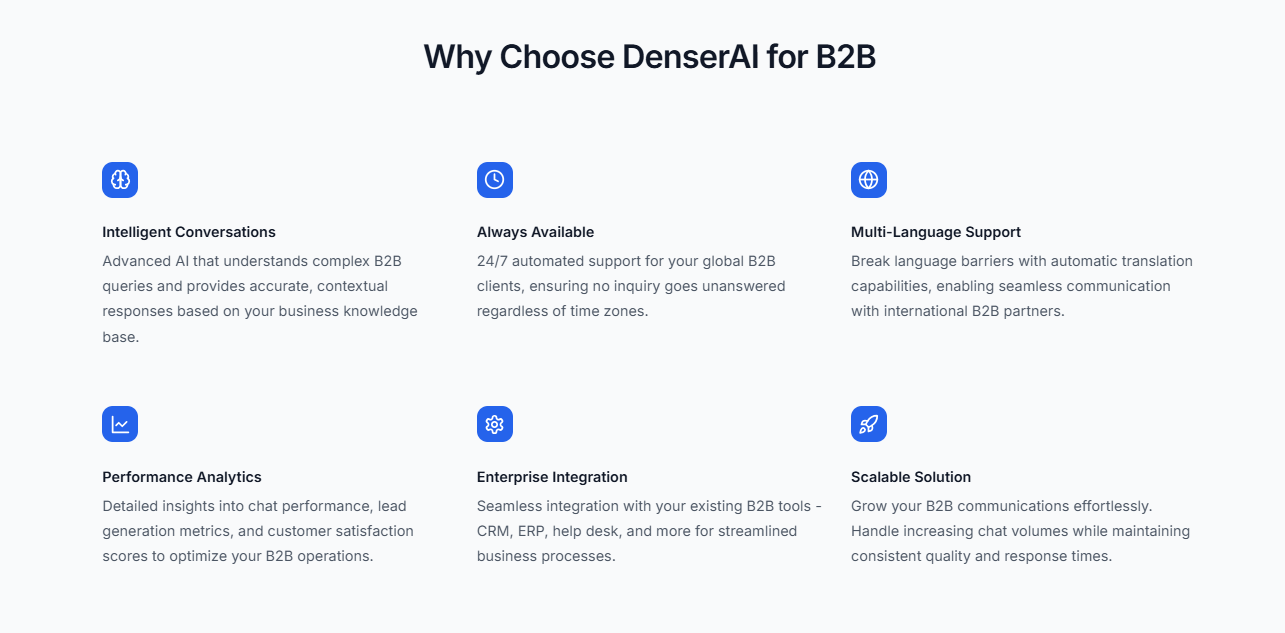
Sign up for a free trial or schedule a demo now.
FAQs About Enterprise Chatbot Solutions#
What is an enterprise chatbot?#
An enterprise chatbot is an AI-powered virtual assistant that automates customer interactions, support tasks, and internal workflows.
Unlike basic bots, it uses machine learning and natural language processing (NLP) to provide personalized, real-time responses across websites, apps, and messaging platforms.
What are enterprise AI solutions?#
Enterprise AI solutions are AI-driven tools that help businesses automate processes, analyze data, and improve decision-making. These include chatbots, predictive analytics, and AI-driven customer support, which are used in industries like finance, healthcare, and retail.
How to build an enterprise chatbot?#
You can start by defining its purpose, whether for customer support, sales, or internal tasks. Choose a chatbot platform with NLP, integrations, and automation capabilities.
You must develop conversation flows, train the AI with real interactions, and integrate it with your CRM or business tools. Once deployed, you have to monitor and optimize its performance.
How do I cancel my chatbot subscription?#
You can log into your provider’s platform and go to the billing or subscription section. Follow the cancellation steps so you understand the terms and any required notice period.
Then, confirm cancellation and check for an email verification to avoid future charges. If you need help, you can contact the provider's support team.
Related Reading#
- Best AI Chatbot Solutions for Business — Our comprehensive guide comparing the best AI chatbot solutions in 2026.
- Top AI Chatbot Solution Providers — Compare 10 leading chatbot vendors by features, pricing, and enterprise readiness.
- AI Chatbot Solutions With Advanced Features — Deep dive into RAG, NLP, and generative AI chatbot technologies.